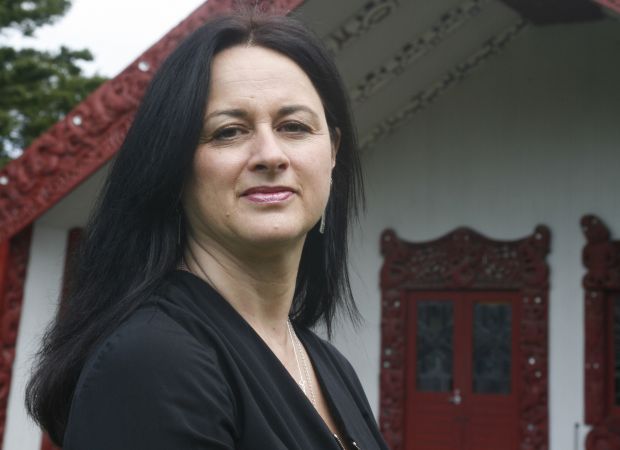Prisoners value words and writing
23 September 2016
Many prisoners place high value on words and writing, thanks in part to the influence of hip hop, rap artists and poets, says Tracey McIntosh, who has been volunteering at Auckland Region Women’s Corrections Facility for the past nine years.
 Tracey, Associate Professor of Sociology at the University of Auckland, is of Tūhoe descent. She is also Co-Director of Ngā Pae o te Māramatanga, New Zealand’s Māori Centre of Research Excellence. Her current area of research is violence in our society – why it’s happening and how we can reduce it.
Tracey, Associate Professor of Sociology at the University of Auckland, is of Tūhoe descent. She is also Co-Director of Ngā Pae o te Māramatanga, New Zealand’s Māori Centre of Research Excellence. Her current area of research is violence in our society – why it’s happening and how we can reduce it.
Back in 2007, Tracey was asked to support two young women studying for NCEA qualifications in Auckland Region Women’s Corrections Facility. The support grew to include other women and their educational aspirations.
Writing through their own experiences
“Teaching creative writing came from working with these young women doing NCEA and encouraging them to write through their own experiences,” Tracey says.
“Creative writing is the output but actually, it’s about being human together, talking and reflecting, and learning together.
“A number of the women are writing their life stories. It’s a way for them to reflect on their lives and why they have acted in the ways they have. It’s quite astonishing the things I have learned from these women.”
Cheryle Mikaere, Prison Director, Auckland Region Women’s Corrections Facility, says Tracey’s ongoing support is “brilliant” and her creative writing classes empowering.
“The women can probe their deepest, darkest experiences and pull together a lifetime of hurt,” she says. “Their brash bravado is a mask they wear in prison but in the writing class, the mask comes down as they use their literary skills to tell their raw and powerful stories.”
Violence a part of their identity
Once, when Tracey told a group of women she had never been hit by a man, the women were astounded. How could that be? “For many of the women, violence has become a significant part of their identity. I have come to understand how difficult it is to make change that is sustained and the women are helping me understand this process through their work.”
Tracey believes we all have the right to beauty in our lives. Although creative writing draws on a “deep, dark well of experience”, it can also be used to provide some distance from that experience.
“You can imagine yourself in different places, spaces and time, and so writing can be liberating,” she says.
She uses humour, colour and images – often grounded in the natural landscape – to encourage lightness in the women’s writing.
“I’ve done public readings of their work and people are always astonished by the power and the quality of the writing,” Tracey says. “Audiences have included police, judges, politicians, activists and academics, who have told me how moved they are by the sentiments addressed.”
Transformative value of education and learning
Tracey, who received a Tertiary Teaching Excellent Award in 2016, says the most important element of teaching and learning is their transformative value – their ability to change lives and also have an impact on future generations.
In a video about the award, one prisoner says that Tracey has never let her down. Another says of her writing: “I have something that will get me beyond these four walls.”
How difficult is it to hear and read week after week about the “deep, dark well” of the women’s experiences? Sometimes, Tracey says, when she leaves the prison car park, it feels hopeless. At other times, she feels hopeful.
“After a session, I self-reflect on what’s happened,” she explains. “I also write in my professional life, and give seminars and presentations about making positive change through education and learning. That also helps.”
"Social justice and volunteer ethos"
Asked what motivates her to volunteer every week, she says she it feels like a natural thing to do. “For me, as a Māori woman, it’s important to engage with all of our women. I also come from a family with a strong social justice and volunteer ethos so this is a way I can use my skills.
“I get a huge amount of satisfaction from it and have learned so much. I never forget the harm that’s been done but in the end, it’s about being human.”
Over January, Tracey runs an intensive two-week creative writing programme at Auckland Region Women’s Corrections Facility. She’s also keen to see the women’s writing published as a taonga for them and to have their voices heard.
“A lot of prisoners’ writing has been published globally but there’s not much of it in New Zealand,” she says.
Tracey says she has always felt very welcomed into the prison environment but it’s not a welcome she feels entitled to. Respect, honesty, sensitivity and trust are important ingredients in building positive, sustainable relationships with the prisoners.
Links
![]() Two poems written by prisoners
Two poems written by prisoners
RNZ’s Nine to Noon interview on the incarceration of New Zealand women
LATEST POSTS
Arts Articles Categories
- Accessibility
- Accessible Arts
- Achievements Celebrations
- Artist My Stories
- Arts Accessibility
- Arts Culture
- Arts Culture Venues
- Arts For All
- Arts In Corrections
- Canterbury Region
- Circus
- Creative Spaces
- Creative Wellbeing
- Dance
- Maori Art
- Maori Arts
- Mental Health
- Music Sound
- Professional Development Arts
- Theatre
- Tikanga Practices
- Visual Arts
- Writing Publishing


